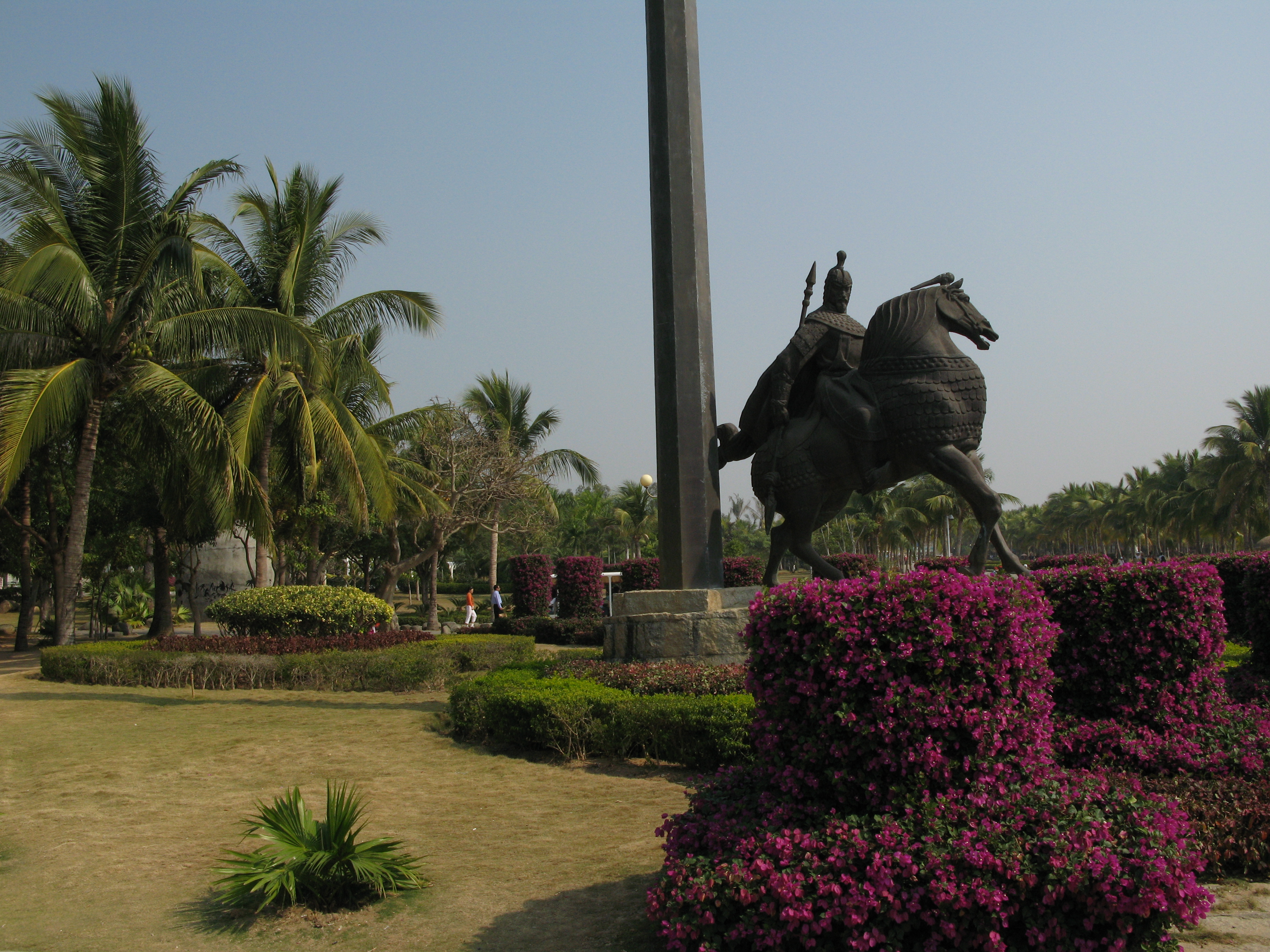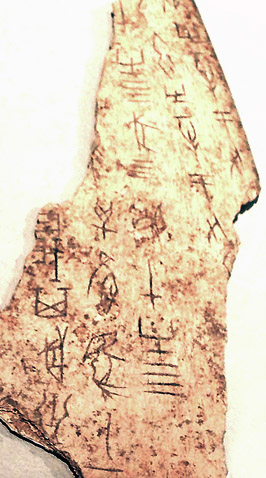|
Ma Yin
Ma Yin (; c. 853 – December 2, 930), courtesy name Batu (霸圖), also known by his posthumous name as the King Wumu of Chu (楚武穆王), was a Chinese military general and politician who became the founding ruler of the Chinese Ma Chu dynasty during the Five Dynasties and Ten Kingdoms period. He was the only monarch who carried the title of "king" in his dynasty.Ma Yin's title was ''Wang'' (王) in Chinese, which could be translated as either "Prince" or "King" in English. The translation of "Prince" will be used here during the time that he carried the title of ''Wang'' of Chu during Later Liang and most of Later Tang. The translation of "King" will be used after he was created the ''Guowang'' (literally, "State King/Prince") of Chu by Li Siyuan, a title that carried for the rest of his life. He initially took control of the Changsha region in 896 after the death of his predecessor Liu Jianfeng, and subsequently increased his territorial hold to roughly modern Hunan and n ... [...More Info...] [...Related Items...] OR: [Wikipedia] [Google] [Baidu] |
Ma (surname)
Ma () is a Chinese family name. The surname literally means "horse". As of 2006, it ranks as the 14th most common Chinese surname in mainland China. In 2019 it was the 13th most common surname in mainland China. A 2013 study found it to be the 13th most common, shared by 17,200,000 people or 1.290% of the population, with the province with the most being Henan. It is the 52nd name on the ''Hundred Family Surnames'' poem.K. S. Tom. [1989] (1989). Echoes from Old China: Life, Legends and Lore of the Middle Kingdom. University of Hawaii Press. . From He (surname) adopted name "Ma" (馬), the first word of the district Ma Fu, as their surname. Other romanizations include Mah, Beh, and Mar. Hui people, Hui Muslims, Salar people, Salars, Bonan people, Bonan and Dongxiangs, Dongxiang people commonly adopted Ma as the translation for their surname Mahmud (name), Mahmud / Muhammad (name), Muhammad. During the Ming dynasty, the Zhengde Emperor had a Uyghur concubine with the surname Ma. It ... [...More Info...] [...Related Items...] OR: [Wikipedia] [Google] [Baidu] |
Posthumous Name
A posthumous name is an honorary Personal name, name given mainly to revered dead people in East Asian cultural sphere, East Asian culture. It is predominantly used in Asian countries such as China, Korea, Vietnam, Japan, Malaysia and Thailand. Reflecting on the person's accomplishments or reputation, the title is assigned after death and essentially replaces the name used during life. Although most posthumous names are given to royalty, some posthumous names are given to honour significant people without hereditary titles, such as courtiers or General officer, military generals. To create a posthumous name, one or more adjectives are inserted before the deceased's title. The name of the state or domain of the owner may be added to avoid ambiguity. History Origins Early mythological rulers such as Emperor Yao were known to have posthumous names. Archaeology, Archaeological discoveries have shown that the titles of kings as far back as the Zhou dynasty (1046 to 256 BC) are po ... [...More Info...] [...Related Items...] OR: [Wikipedia] [Google] [Baidu] |
Ma Yuan (Han Dynasty)
Ma Yuan (; 14 BC – 49 AD), courtesy name Wenyuan, also known by his official title ''Fubo Jiangjun'' (伏波将军; "General who Calms the Waves"), was a Chinese military general and politician of the Eastern Han dynasty. He played a prominent role in defeating the Trung sisters' rebellion. His military and political achievements included helping Emperor Guangwu of Han, Emperor Guangwu unite the empire and putting down rebellions of the Trung Sisters (in Jiaozhi, modern Vietnam) and the Wulin tribes (in modern eastern Guizhou and northwestern Hunan). He fell ill during an expedition to modern Hunan in 49 AD, and died soon afterwards. Prior to that, Ma Yuan contributed to Emperor Guangwu's defeat of the warlord Wei Xiao (), who controlled the modern eastern Gansu region. Life and career Early life Ma Yuan was a native of what is now Xingping, Shaanxi province, descended from the Warring States period general Zhao She from the State of Zhao. Qiang campaign He also subjugate ... [...More Info...] [...Related Items...] OR: [Wikipedia] [Google] [Baidu] |
Han Dynasty
The Han dynasty was an Dynasties of China, imperial dynasty of China (202 BC9 AD, 25–220 AD) established by Liu Bang and ruled by the House of Liu. The dynasty was preceded by the short-lived Qin dynasty (221–206 BC) and a warring interregnum known as the Chu–Han Contention (206–202 BC), and it was succeeded by the Three Kingdoms period (220–280 AD). The dynasty was briefly interrupted by the Xin dynasty (9–23 AD) established by the usurping regent Wang Mang, and is thus separated into two periods—the #Western Han (202 BC – 9 AD), Western Han (202 BC9 AD) and the #Eastern Han (25–220 AD), Eastern Han (25–220 AD). Spanning over four centuries, the Han dynasty is considered a Golden ages of China, golden age in Chinese history, and had a permanent impact on Chinese identity in later periods. The majority ethnic group of modern China refer to themselves as the "Han people" or "Han Chinese". The spoken Chinese ... [...More Info...] [...Related Items...] OR: [Wikipedia] [Google] [Baidu] |
New History Of The Five Dynasties
The ''Historical Records of the Five Dynasties'' (''Wudai Shiji'') is a Chinese history book on the Five Dynasties period (907–960), written by the Song dynasty official Ouyang Xiu in private. It was drafted during Ouyang's exile from 1036 to 1039 but not published until 1073, a year after his death. An abridged English translation by Richard L. Davis was published in 2004. The history book is a typical representative of the use of Spring and Autumn style (春秋笔法). It has high literal value but its content may not be accurate enough. One of the official Twenty-Four Histories of China, the book is frequently referred to as the ''New History of the Five Dynasties'' (''Xin Wudai Shi'') in order to distinguish it from the ''Old History of the Five Dynasties'' which was published in 974. Though both books follow a similar format, Ouyang's book is more concise and markedly more analytical. Contents ''New History of the Five Dynasties'' covers the Later Liang, Later Tan ... [...More Info...] [...Related Items...] OR: [Wikipedia] [Google] [Baidu] |
Old History Of The Five Dynasties
The ''Old History of the Five Dynasties'' ( zh, t=舊五代史, pinyin=, p=Jiù Wǔdài Shǐ) was an official history mainly focusing on Five Dynasties and Ten Kingdoms period, Five Dynasties era (907–960), which controlled much of northern China proper, China. And it also includes some history of other south states during the era. It was compiled by the Song dynasty official-scholar Xue Juzheng in the first two decades of the Song dynasty, which was founded in 960. It is one of the Twenty-Four Histories recognized through Chinese history. The book comprises 150 chapters, and was in effect divided into 7 books, they are: ''Book of Liang'' (24 volume), ''Book of Tang'' (50 volume), ''Book of Jin'' (24 volume), ''Book of Han'' (11 volume), ''Book of Zhou'' (22 volume), ''Biography, Liezhuan'' (7 volume) and ''Zhi'' (12 volume), respectively''.'' After the ''New History of the Five Dynasties'' by Ouyang Xiu was published, it was no longer popular. In the 12th century it was remov ... [...More Info...] [...Related Items...] OR: [Wikipedia] [Google] [Baidu] |
Henan
Henan; alternatively Honan is a province in Central China. Henan is home to many heritage sites, including Yinxu, the ruins of the final capital of the Shang dynasty () and the Shaolin Temple. Four of the historical capitals of China, Luoyang, Anyang, Kaifeng and Zhengzhou, are in Henan. While the province's name means 'south of the river', approximately a quarter of the province lies north of the Yellow River. With an area of , Henan covers a large part of the fertile and densely populated North China Plain. Its neighboring provinces are Shaanxi, Shanxi, Hebei, Shandong, Anhui, and Hubei. Henan is China's third-most populous province and the most populous among inland provinces, with a population of over 99 million as of 2020. It is also the world's seventh-most populous administrative division; if it were a country by itself, Henan would be the 17th-most populous in the world, behind Egypt and Vietnam. People from Henan often suffer from regional discrimination ... [...More Info...] [...Related Items...] OR: [Wikipedia] [Google] [Baidu] |
Xuchang
Xuchang ( zh, s=, t= ; postal: Hsuchang) is a prefecture-level city in central Henan province in Central China. It is bordered by the provincial capital of Zhengzhou to the northwest, Kaifeng to the northeast, Zhoukou to the east, Luohe to the southeast, and Pingdingshan to the southwest. Its population was 4,307,488 inhabitants at the final 2010 census, of whom 1,952,666 lived in the built-up (or "metro") area made up of Weidu and Jian'an districts (named from Emperor Xian of Han’s era name) and Changge City largely being urbanized. In 2007, the city was named as one of China's top ten livable cities by Chinese Cities Brand Value Report, which was released at 2007 Beijing Summit of China Cities Forum. Administration The prefecture-level city of Xuchang administers 2 districts, 2 county-level cities and 2 counties. * Weidu District () * Jian'an District () * Yuzhou City () * Changge City () * Yanling County () * Xiangcheng County () History During the early ... [...More Info...] [...Related Items...] OR: [Wikipedia] [Google] [Baidu] |
Emperor Xuānzong Of Tang
Emperor Xuanzong of Tang (27 July 810 – 7 September 859) was an emperor of China's Tang dynasty, reigning from 25 April 846 until his death. Personally named Li Yi, later renamed Li Chen (), and known before his reign as the Prince of Guang, he was considered the last capable emperor of Tang China. Succeeding emperors after Xuanzong would either be too young or be dominated by eunuchs or warlords. Emperor Xuanzong was the 13th son of Emperor Xianzong () and an uncle of the previous three emperors, Emperor Jingzong, Emperor Wenzong, and Emperor Wuzong. To distinguish Emperor Xuanzong from his ancestor Emperor Xuánzong (personal name Li Longji), as their temple names are rendered identically in Wade–Giles and when pinyin tonal marks are not used, Xuanzong is occasionally referred to as Xuanzong II in western sources; in Chinese, however, their memorial titles (宣宗 for him and 玄宗 for Li Longji) are clearly distinct and this device is not used. Background Li Yi w ... [...More Info...] [...Related Items...] OR: [Wikipedia] [Google] [Baidu] |
Guangxi
Guangxi,; officially the Guangxi Zhuang Autonomous Region, is an Autonomous regions of China, autonomous region of the China, People's Republic of China, located in South China and bordering Vietnam (Hà Giang Province, Hà Giang, Cao Bằng Province, Cao Bằng, Lạng Sơn Province, Lạng Sơn, and Quảng Ninh Provinces) and the Gulf of Tonkin. Formerly a Provinces of China, province, Guangxi became an autonomous region in 1958. Its current capital is Nanning. Guangxi's location, in mountainous terrain in the far south of China, has placed it on the frontier of Chinese civilization throughout much of History of China, Chinese history. The current name "Guang" means "expanse" and has been associated with the region since the creation of Guang Prefecture in 226 AD. It was given Administrative divisions of the Yuan dynasty, provincial level status during the Yuan dynasty, but even into the 20th century, it was considered an open, wild territory. The abbreviation of the regi ... [...More Info...] [...Related Items...] OR: [Wikipedia] [Google] [Baidu] |




